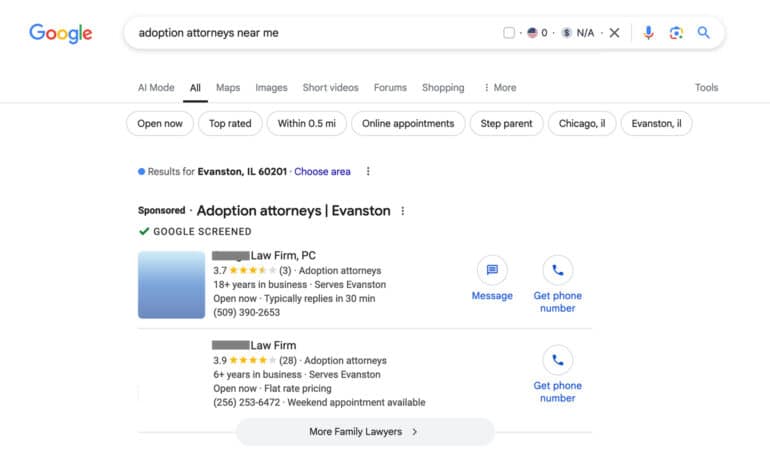Did you know that 78% of people who search for local services on their smartphones visit a business within a day? If you’re a law firm, this statistic highlights the immense opportunity Google’s Local Service Ads (LSAs) present for capturing local clients right when they need legal help. With LSAs, law firms can ensure they are visible at the very top of Google search results, driving calls and messages from potential clients in their area. But what exactly are LSAs, how do they work, and how can they benefit your law firm?

This comprehensive guide will explore all these aspects, comparing LSAs with traditional PPC ads, explaining why law firms should take advantage of them, and providing insight into common questions, including how schema markup plays a role in enhancing LSA performance.
What Are Google Local Service Ads?
Google Local Service Ads are a form of advertising designed to help local businesses, like law firms, appear at the very top of Google search results when potential clients search for specific services in their area. Unlike traditional Google Ads, which operate on a pay-per-click (PPC) basis, LSAs function on a pay-per-lead model. This means law firms only pay when a potential client calls or sends a message directly through the ad.
What sets LSAs apart is their integration with Google’s local services platform. When someone searches for legal services, LSAs are the first results they see, appearing above organic listings and paid ads. This prime position significantly increases the likelihood of your firm getting noticed by prospective clients, especially when they’re searching for services in your specific geographic location.
But the key benefit of LSAs is that you’re not simply paying for a click — you’re paying for a real, qualified lead. This type of direct lead generation is incredibly valuable in an industry like law, where clients typically only seek legal help when they’re ready to take action. This makes LSAs particularly valuable for law firms looking to convert leads quickly.
How Are LSAs Different from Traditional PPC?
At first glance, LSAs and traditional pay-per-click campaigns may seem similar, but there are key differences that set them apart. Understanding these distinctions can help law firms decide which advertising method will yield the best results.
1. Payment Model
- LSAs: You pay per lead, not per click. This means you only pay when a user engages with your ad by calling or sending a message, rather than simply clicking on it. This makes LSAs more cost-effective in some cases, as you’re not paying for traffic that doesn’t convert.
- PPC: With PPC ads, you pay each time someone clicks on your ad, regardless of whether that click results in a lead or a sale. While PPC ads can drive traffic, they don’t guarantee engagement, making them potentially more expensive.
2. Ad Placement
- LSAs: These ads are shown at the very top of the search results, above organic listings and PPC ads. This prominent placement ensures maximum visibility to users who are specifically looking for local services, like a lawyer in their area.
- PPC: Although PPC ads are also displayed in the search results, they appear below the LSAs, meaning they don’t enjoy the same level of exposure.
3. Lead Qualification
- LSAs: Google screens and qualifies the businesses that participate in the Local Services platform. To advertise through LSAs, law firms must pass a background check and meet specific licensing requirements, ensuring that users are only presented with reputable, qualified firms.
- PPC: Anyone can run a PPC ad as long as they have the budget. There’s no verification process that confirms whether the business is truly qualified or trustworthy.
4. Trust and Credibility
- LSAs: Local Service Ads come with Google’s badge of trust. For law firms, they display a green “Google Screened” checkmark badge. This badge signals to potential clients that the business has met Google’s standards for professionalism and licensing.
- PPC: There are no such badges or credentials for PPC ads. While a strong PPC campaign can bring traffic, it doesn’t automatically carry the same level of trust that comes with LSAs.
Why Should Law Firms Take Advantage of LSAs?
As a law firm, investing in Google Local Service Ads can offer several benefits that traditional PPC campaigns may not. Here are a few reasons why LSAs can be a game-changer for law firms looking to grow their business.
1. Increased Visibility in Local Search Results
LSAs place your firm at the top of Google’s search results, making it easier for local clients to find you. Since legal services are often highly localized, appearing in this prime position ensures that you’re visible to clients in your area who are actively seeking help.

A study by Google shows that 56% of people who search for local businesses on mobile devices visit that business within a day. When your firm appears at the very top of the search results through LSAs, you’re tapping into this immediate intent and maximizing your chances of converting those searches into actual clients.
2. Cost-Effective Lead Generation
Unlike PPC campaigns that charge for each click, LSAs charge based on lead generation. This means you’re only paying for qualified prospects who are genuinely interested in your services. As a result, LSAs can provide a more predictable return on investment (ROI) compared to traditional paid search ads.
For law firms, lead generation is the key to success. Investing in LSAs allows you to track the actual leads generated through your ad campaign, rather than just tracking clicks that may not convert into clients.
3. Higher Trust With the “Google Screened” Checkmark
The Google screened icon that appears with LSAs helps to build trust with potential clients. This badge assures them that your firm has passed Google’s screening process, including license verification. This endorsement can be a deciding factor for clients choosing between several firms.
The psychological impact of seeing this checkmark is significant. It communicates that your firm has been vetted by Google, adding an extra layer of legitimacy and comfort to prospects who may be nervous about hiring a lawyer online.
Note that many online sources conflate the Google Screened checkmark with the Google Guarantee badge. Law firms and legal services only qualify for Google “screened” not “guaranteed”. The Google Guarantee is for contractors, such as home repair or plumbers and electricians.
4. Better Lead Quality
With LSAs, the leads generated are typically more qualified. Since these leads come from users who have either called or messaged your firm directly, they’re often more serious about hiring a lawyer than those who simply clicked on a PPC ad.
This increased lead quality means fewer wasted marketing dollars and more productive conversations with potential clients. It’s easier to turn these warm leads into actual clients since they’ve already taken the step to reach out to your firm.
5. Reputation Management
LSAs feature client reviews, which are prominently displayed with your listing. Positive reviews can help establish your firm’s reputation and provide social proof to new clients. Many law firms have found that these reviews directly contribute to higher conversion rates, turning leads into clients.
Reputation is crucial in the legal industry. By displaying reviews directly within your LSA, you’re giving potential clients a quick way to assess your firm’s performance, which can help them make a more informed decision.
Success Stories: Real Law Firm Wins with LSAs
Numerous law firms have seen excellent results from using Google’s Local Service Ads. A standout example is Chavez Freed Law Office, which practices civil rights, anti-discrimination, criminal defense and prisoner advocacy law. Within just a few months of setting up its LSA, Chavez-Freed saw a dramatic increase in phone calls from prospective clients. The LSA platform allowed the firm to target specific legal services in their local area, which directly contributed to the uptick in high-quality leads.
Addressing Common Questions About LSAs
Schema markup is a form of structured data that can help search engines better understand and display your firm’s information in search results. While LSAs don’t directly rely on schema markup, it can still play a role in improving your firm’s visibility online. Adding the appropriate local business schema to your website helps reinforce your business’s legitimacy and improves local search rankings, indirectly supporting your LSA efforts. Schema markup also ensures that your firm’s name, location, and services are consistently displayed across various Google properties, helping Google make the most accurate connections between your website and LSA ads. This synergy helps increase the likelihood that your firm will be shown in search results for relevant queries.
Setting up Google Local Service Ads is relatively straightforward, but it does require some preparation. Law firms must go through a verification process with Google to prove their legitimacy and qualifications. This process includes submitting documentation like law licenses, business insurance, and other necessary credentials, along with selecting practice areas. Once verified, you can create an LSA campaign through Google’s platform, setting your budget and service areas accordingly. The key to success with LSAs is ensuring that all the information is accurate and up-to-date. Regularly reviewing and optimizing your ads is crucial to maintaining their effectiveness over time.
Google provides detailed reporting tools for LSAs, including metrics such as the number of leads received, the cost per lead and the overall performance of your ads. This data can help law firms assess the effectiveness of their campaigns and make necessary adjustments to improve results. Keep in mind that tracking lead quality is just as important as tracking lead volume. By focusing on both the quantity and quality of the leads generated, law firms can refine their campaigns to attract even more ideal clients.
The Importance of Working with a Professional
While LSAs offer powerful tools for law firm marketing, successfully managing these ads does require expertise. Law firms often find that partnering with a professional marketing team that specializes in law firm SEO and PPC is the best way to maximize the effectiveness of their LSAs. Your firm can ensure ads are properly set up and optimized, managed and monitored, and your investment is maximized. It’s essential to work with experts who understand the intricacies of local service ads and can continually adjust campaigns based on performance metrics so your ads see tangible results.
Stay In the Know
Google’s Local Service Ads are a valuable tool for law firms looking to dominate local search results and generate high-quality leads. By understanding how LSAs work, their differences from PPC and the benefits they offer, you can make more informed decisions about incorporating this advertising model into your law firm’s digital marketing strategy.
Image © iStockPhoto.com.

Sign up for Attorney at Work’s daily practice tips newsletter here and subscribe to our podcast, Attorney at Work Today.
















